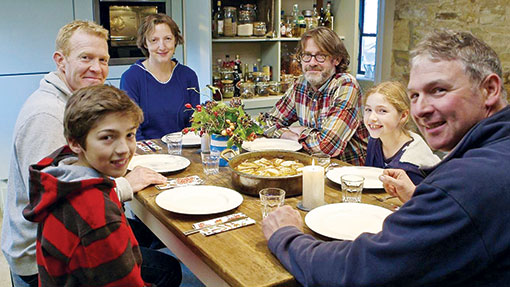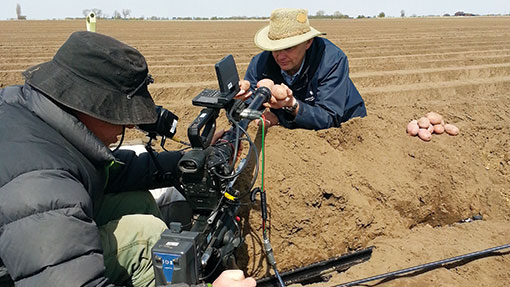What farmers can expect when the TV cameras arrive

Farms are in high demand as TV locations, but what’s it really like when a team of producers, celebrity presenters and cameras descend on your farm? Rachel Jones speaks to a family who’ve done it
Last year, Simon and Sarah Righton opened the gates to their mixed farm in Gloucestershire to the BBC. For eight months the crew followed Adam Henson and TV chef Nigel Slater as they grew, reared and cooked some of the country’s favourite ingredients on the Righton’s farm. The result was Adam and Nigel’s Farm Kitchen – a four-part series following the journey of food from field to plate. We spoke to the family to find out what the experience was like behind the scene.
Where and what do you farm?
Sarah: We’re a 300-acre tenanted farm near Moreton in Marsh in Gloucestershire. Half is in grass for sheep and beef, the other half is in arable – wheat, oats and either oilseed rape or linseed.
How were you selected as a location?
Sarah: The BBC called us before Christmas in 2012 saying they were looking for a farm in our area to host a food and farming programme. We had a few visits from the production team and then it all went quiet, so we assumed they’d gone elsewhere.
It wasn’t until March 2013 that we got another phone call. When they visited again they saw potential in our newly decorated barn as a location for Nigel’s kitchen. That probably sealed it for them and filming started a week later.
Why did you say yes?
Sarah: It sounded like an amazing thing to be involved with. We’ve had phone calls from TV companies before, but knowing that Adam Henson and Nigel Slater were involved gave this one some credibility. We like doing farm visits and thought this was an amazing chance to get farming on to primetime TV and reach lots of people.
Were the cameras and crew at all obtrusive?
Simon: When they first arrived the sound man asked us to be quiet when we were working in the yard. The production manager quickly came over and said “just ignore him – they’ll have to work around it!” They always said that they didn’t want to jeopardise any of our farming routines.
Sarah: There was one time that Simon and I needed to chat so we went into the office. Suddenly a helicopter camera came past and I thought god, we can’t go anywhere. But generally they did everything in their power not to affect the running of the farm.

What were filming hours like?
Sarah: We had no idea how much time it was going to take. In the opening credits Nigel was on the back of the pick-up with one of the farm dogs. That alone took the best part of a day to film. On the first take a plane flew over, then a train went past, then the dog jumped off the car so it had to be reshot over and over again… Hats off to the filming crew, they do put the hours in.
What was your involvement during filming?
Thinking about using your farm as a location? Here are Sarah’s tips:
- Find out what the programme is about and what the aim is. Make sure it is something you believe in.
- Do your research. Find out who else in involved in the programme, look on the internet to see what they’ve done in the past and check you’re happy with the quality and content.
- You have no editorial control during or after filming, so make sure you ask all the questions you need to ask before you sign the contract.
Simon: Sometimes they would just lock themselves away in the kitchen to film Nigel’s part and we would only see them at lunch. But when Adam came and they filmed the farming side of things we’d be there to give him a hand – finding cattle to be in the yard, or sourcing chickens to appear in shot.
Sarah: At the start we were told that we wouldn’t really be needed very much and would only feature in it in a small way, but it did end up taking up a lot of time.
How many people were on your farm at any one time?
Sarah: On the whole between eight and 13 people. At the end of each programme they hosted and filmed a sit-down feast, so there could be up to 25 people with all the extra help in the kitchen.
What changes did you make to your usual farming routine?
Simon: We turned the kids’ old play area into a vegetable patch. We grew rice for the programme, which we had never done before. We put the rice in a polytunnel and heated it with our bio-burner which we use to heat the house. We also grew durum wheat and spring wheat alongside our normal wheat crop. It was lucky because we had the wet autumn in 2012 and couldn’t drill, so we had a strip we could use. In a normal year we would have planted everything up. We had to buy in a few special chemicals because ours weren’t licensed for durum wheat, but apart from that it wasn’t too bad.
Any hiccups along the way?
Simon: They wanted us to grow mushrooms, so we put them in the polytunnel with the rice. It never clicked that it was a fungus and about a week after the mushrooms burst out of the bag, the rice went downhill.
Sarah: We watered the rice every day and spent a lot of time tending to it, so it was really quite upsetting when it started dying. We tried fungicides but it was too late.
What did the kids think about it?
Sarah: The kids loved it. They were often asked to be extras for taste testing – there weren’t many kids at school who could say Nigel Slater made their supper last night. Our daughter Meg did a ride-past on the pony for the cameras and the boys loved the high-tech helicopter cameras and camera cars.
Did you see any footage before it was aired?
Sarah: We were invited to the editing suites in London in October and saw a few little clips, but our first chance to see the programme was when the first episode came out on TV. We had a few people over to watch it with us because we thought there’d be safety in numbers.
What did you think about how your farm was portrayed?
Sarah: The camera crew seemed to make the day-to-day workings of the farm look special. There were a couple of remote controlled helicopters taking amazing birds-eye footage, which shows the farm in a beautiful new perspective.
What has reaction been like to the series?
Simon: There’s been a lot of mickey taking. Most local farming were very pleased with it, though. It’s not often you get farming programmes on the telly and a lot of people said that ours was informative. And with the cooking in it as well, it probably got a lot more viewers too.
Sarah: It was great – we’ve only heard good things. We’ve got a loyal band of customers and they loved seeing it.
Did you get any criticism?
Simon: In one episode we were drilling and some people noticed that in one shot the steps were left down on the drill, and in the very next shot they were up. It was funny how many people noticed it.
Sarah: A couple of people said it looked like we have an easy life. I don’t think the programme showed the whole picture of what happens on the farm – the heartache, the trudging through fields in the winter – but that’s not what this programme was all about. It was a cooking programme.
They did show a bad lambing in episode three. The lamb had died and we couldn’t get it out. It was good that they included it because that’s what happens on a farm – it doesn’t always have a happy ending.
What was your favourite bit of the series?
Simon: I liked the episode which promoted our four Glamrock pigs which are bred from a Hamrock boar and a Gloucester Old Spot pig. When we killed it and tasted it Nigel was very impressed.
Sarah: I was really happy when I saw Simon in the programme. He often tries not to get involved talking to people, but now I’ve seen him in action with a camera on him I think he can do more of that stuff.
Has it had any positive effects on your business?
Sarah: It’s given us the opportunity to be on primetime TV – you can’t put a price on that. It’s brought back few old customers who haven’t been in for a while and we can’t go anywhere without someone mentioning it. We did also receive a location fee and were paid for our time – for example, watering the rice, tending to the vegetable patch and so on.
We did have to delay the opening of our new farm shop by a few months, so loss of business was a consideration. However, in the end we managed to launch just as the first episode aired in November, so being on the programme got us some local publicity in the run-up to Christmas.
Would you do it again?
Simon: Yes. We’d be happy to have the same crew back again. We think there’s still a lot more that could be shown about farming and the related industries. Anything that promotes British agriculture has to be a good thing.
Sarah: Yes, we would. It was great fun and there are still a lot more stories to tell. I’m not sure if they’d come back here, but we’d be up for it.
